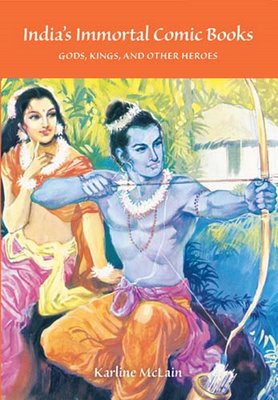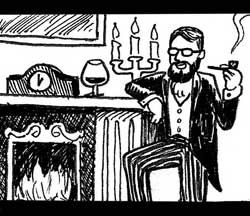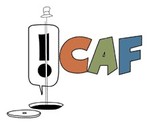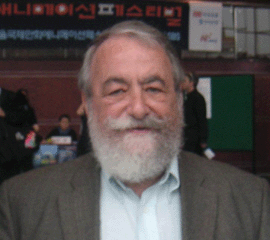Several months ago, a friend asked me about WATCHMEN. She'd read the graphic novel and liked it, but she wasn't utterly blown away like she thought she'd be, and she wanted to know what I thought about the book. I sat down to "write a quick email" in reply, and I came up for breath a little shy of 1000 words later.I've been wanting to polish this up into a "proper" essay, replete with links and images a-plenty; but alas, I am not possessed of Doctor Manhattan's unique way with time. So I've decided to just "go wild" and post a plain vanilla, barely-polished version of that original email. Will it veer off topic? Yes. Are its ideas under-developed? Of course. Are all of its ideas original? No, but I only steal from the best. Does it just peter-out at the end? Aye. Will its unfinished state embarrass me? Heck no. Do I want to say more about all of this? You bet. And I hope to, right here, eventually. Until then, I give you, off the top of my balding, decidedly un-Moore-like head..."So, What's the Big Deal
about WATCHMEN?"
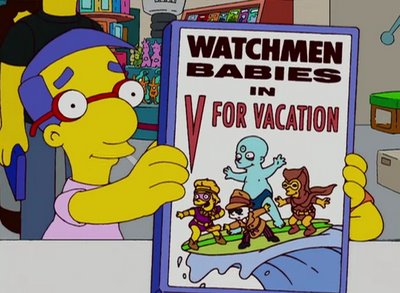
Actually, I can understand this point of view. The hype -- the hagiographical zeal -- that surrounds
Watchmen can't help but set up nigh-impossibly high expectations for new readers today. But...
Part of the situation is that when
Watchmen appeared, 22-ish years ago, nothing quite like it had been done before. Since then, people have ripped it off -- er, paid it homage -- a zillion times. Plus, the type of psychological nuances that
Watchmen contains are lots more common today, or at least the attempt is. So characterization-wise, it can't help but seem somewhat less amazing now than it was back in the day. Plus, lots of comics today try to envision "what effect superheroes would have on the 'real' world." Again, when
Watchmen came out this sort of thing practically didn't exist.
But there are two other parts which, to me, make
Watchmen still stand out.
I'm a form / process geek, and formally
Watchmen kicks freakin' ass. Page design, cover design, series design, panel arrangement, transitions, narrative / thematic cross-cutting -- all this stuff is still done with more precision, care, and effect than any
Watchmen -wannabes ever accomplished. Because Alan Moore is a genius when it comes to stuff like this - most of that formal stuff is in his script, although Gibbons contributes enormously. Check out the "Fearful Symmetry" chapter. Look at the first page and the last page, then the second page and the penultimate page, etc.... The layouts mirror each other, and the narrative and themes do a bit, as well, page vs. page, panel vs. panel.
It's stuff like this that you can do in comics but you can't do in any other medium in the same way.
The other biggie is that plot is so
not the totality of
Watchmen. In fact, I find it practically secondary to the larger experience. (I think
Moore did too - viz. the admittedly derivative SF ending.) For me, it's the fact that
Watchmen creates an entire world, a mythology, a history, all in 12 chapters. It gives you a narrative density that "regular" superhero comics might begin to approach after a decade or three.
It helps, of course, that most of the characters are analogues of previous heroes. On one level they're extremely thinly veiled analogues to heroes from Charlton comics; but on a deeper level, they resonate with lots of (super)hero archetypes (just as the Charlton heroes do). The Comedian is
sort of Captain America and the Punisher at the same time; Nightowl is Batman-ish; Silk Spectre is like Phantom Lady or numerous other "good girl" super heroines of the 40s; Rorschach is a "dark avenger," but with the moral compass of Ayn Rand; etc.
But most important, for me, is all the extra material at the end of each chapter. There's where you learn about history and world cultural development and politics and so much else about this world: information that opens up the story so that it's not just a superhero / whodunit / mad scientist story. If you just read the comics narrative without the back-up material, you'll get a very good superhero story, excellently presented, sure. But without the extra material, I'm convinced that today we wouldn't be talking about
Watchmen as much more than a "Yeah, that was a pretty interesting" book.
It's these latter qualities that make me believe that pretty much any
Watchmen adaptation will fall far short of what the original is all about. I've always said that pretty much the only way I could conceive of an adaptation working would be to make it a TV miniseries, or maybe a series of DVDs. Each episode would have a regular narrative section, but then rounding out the hour (or appearing as bonus dvd features) would be things like documentaries, news programs, talk shows, etc.: TV-type things that expand the world just like the print-type things that expand the world in the book. You can try to do some of this type of stuff in one movie with flashbacks, montages, etc., but there's no way that you could get an analogous depth and the breadth of that world in even a 3-hour movie.
Of course, I can't think of a single film adaptation of a novel that manages to convey completely the richness of its source material. Or a comics adaptation of a film, or a book. Or a book of a comic. You get the idea. Anyone who expects an adaptation to "live up to" the original -- to include everything, in exactly the same way, with exactly the same weight and emphasis -- is playing a sucker's game. No adaptation into another medium can ever be 100% faithful to its source; it's physically,
aesthetically, impossible. Nor is it wise. Film has its strengths and weaknesses, as does prose, as does poetry, as does theater, as does comics.
I don't expect that
Watchmen the film will reduplicate the experience of reading the
Watchmen the comic. From all the hype, I know that it at least will mimic the "look" of the comic as much as it possibly can. (Except for the heroes' costumes. Most of them
should look dumpier -- but movie audiences wouldn't stand for that. Or maybe that should read "movie executives.") I would
like to see a film that treats its source intelligently (not just reverently) and utilizes all the tools of cinema in ways as innovative as Moore & Gibbons did the tools of comics. I doubt that could happen, though, no matter the passion of the people behind and in front of the camera. If it were too
avant-garde, I doubt any major studio would have allowed it through to completion, not with so much $$$$ riding on it.
But we'll see – Friday night, I expect...
Image Credit: Milhouse knows the score. Screen-grab from The Simpsons.Labels: adaptation, essays, films, Moore, Simpsons, superheroes, Watchmen
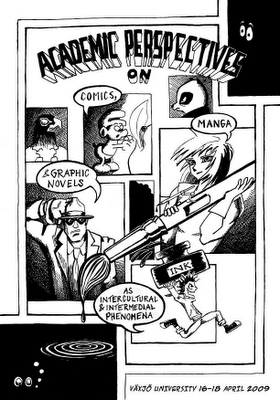 Academic Perspectives on Comics, Manga & Graphic Novels
Academic Perspectives on Comics, Manga & Graphic Novels